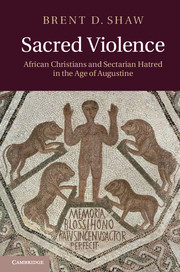Book contents
- Frontmatter
- Contents
- Abbreviations
- Maps
- Acknowledgments
- Introduction
- Chapter 1 This terrible custom
- Chapter 2 Church of the traitors
- Chapter 3 A poisonous brood of vipers
- Chapter 4 Archives of memory
- Chapter 5 The city of denial
- Chapter 6 Ravens feeding on death
- Chapter 7 Little foxes, evil women
- Chapter 8 Guardians of the people
- Chapter 9 In the house of discipline
- Chapter 10 Sing a new song
- Chapter 11 Kings of this world
- Chapter 12 We choose to stand
- Chapter 13 Athletes of death
- Chapter 14 Bad boys
- Chapter 15 Men of blood
- Chapter 16 Divine winds
- Chapter 17 So what?
- Appendix A Bishops and bishoprics in Africa: the numbers
- Appendix B Origins of the division: chronology
- Appendix C The Catholic conference of 348
- Appendix D The Edict of Unity and the Persecution of 347
- Appendix E The mission of Paul and Macarius
- Appendix F Historical fictions: interpreting the circumcellions
- Appendix G The archaeology of suicide
- Appendix H African sermons
- Bibliography
- Index
- References
Chapter 16 - Divine winds
Published online by Cambridge University Press: 07 September 2011
- Frontmatter
- Contents
- Abbreviations
- Maps
- Acknowledgments
- Introduction
- Chapter 1 This terrible custom
- Chapter 2 Church of the traitors
- Chapter 3 A poisonous brood of vipers
- Chapter 4 Archives of memory
- Chapter 5 The city of denial
- Chapter 6 Ravens feeding on death
- Chapter 7 Little foxes, evil women
- Chapter 8 Guardians of the people
- Chapter 9 In the house of discipline
- Chapter 10 Sing a new song
- Chapter 11 Kings of this world
- Chapter 12 We choose to stand
- Chapter 13 Athletes of death
- Chapter 14 Bad boys
- Chapter 15 Men of blood
- Chapter 16 Divine winds
- Chapter 17 So what?
- Appendix A Bishops and bishoprics in Africa: the numbers
- Appendix B Origins of the division: chronology
- Appendix C The Catholic conference of 348
- Appendix D The Edict of Unity and the Persecution of 347
- Appendix E The mission of Paul and Macarius
- Appendix F Historical fictions: interpreting the circumcellions
- Appendix G The archaeology of suicide
- Appendix H African sermons
- Bibliography
- Index
- References
Summary
After following a long and sometimes contradictory path, Augustine was finally to condemn the taking of one's own life as an absolute sin, an inexpiable crime against God. Born at Mondovi, a village only some 12 miles south of Augustine's Hippo Regius, Albert Camus began his Le mythe de Sisyphe with the declaration:
There is only one serious philosophical problem: it is suicide. To judge whether life is or is not worth the pain of living is to answer the fundamental question of philosophy. All the rest – if the world has three dimensions [we must admit that Camus was not a physicist], if the soul has nine or a dozen categories – all these follow. This is the game. We must make a reply.
But Camus’ suicide was very different from Augustine's. For Camus, suicide is provoked, ultimately, by a growing sense of the absurdity of existence. He construed a typical scenario as follows. The stage props of a person's life are present on each ordinary day: “Get up, catch the train, four hours at the office or workshop, dinner, streetcar, four more hours of work, eat, sleep, Monday, Tuesday, Wednesday, Thursday, Friday, Saturday, according to the same rhythm. This path is easily followed most of the time. Only, one day, a ‘why’ arises.” A process of the disintegration of the familiar stage-sets of one's life begins, life becomes a stranger to the one living it, and all normal meaning drains from existence.
This is the pathology of one type of self-killing – a peculiar kind of modern despair. But it is not my suicide problem. Nor was it Augustine's. Camus, who wrote his master's dissertation at the University of Algiers on Augustine and Plotinus, examined by no less a figure than Louis Gernet, knew this too. His novel La mort heureuse – A Happy Death – shows that he was alert to these differences, indeed opposites, between his world and that of Augustine – the contrast with the latter's De beata vita. Perhaps because of this awareness, Camus appended a footnote to his text, admitting that his problem of suicide was, after all, historically contingent: “We will not miss the opportunity,” he says, “to note the specific character of this essay. Suicide can in fact be linked to more honorable considerations. One example: political suicides of protest.” It is precisely this type of suicide, relegated by Camus to a footnote, that is our concern here: a kind of honorable self-killing that was motivated not by a sense of “the absurd” or by the meaninglessness of existence, but rather by the precise opposite. It was a self-inflicted death that was interpreted as full of meaning and one that embraced life, indeed a better one without end.
- Type
- Chapter
- Information
- Sacred ViolenceAfrican Christians and Sectarian Hatred in the Age of Augustine, pp. 721 - 770Publisher: Cambridge University PressPrint publication year: 2011



